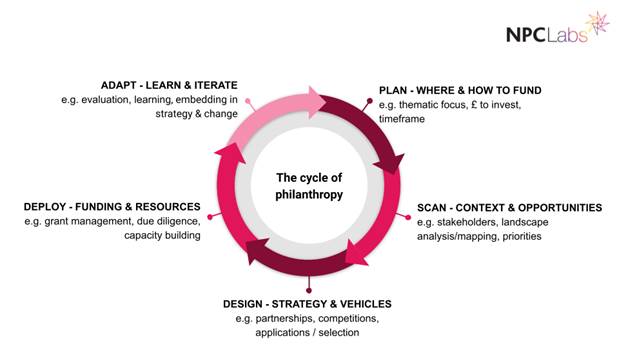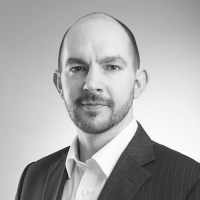Tris Lumley and NPC Aim for Fundamental Change

Influenced by events of recent years, many observers believe that the charitable sector can achieve its maximum potential only with a rethinking of the processes behind funding decisions. Transparency, engagement, collaboration, equity: these are some of the words you're hearing. Despite a growing discussion in the nonprofit sector centered around new modes of thought, change can be slow. Transparency, engagement, collaboration, and equity all imply a shift in power, and the status quo is by definition comfortable for many.
Transparent change means unlearning, generating new knowledge, and doing it inside a glass house. New Philanthropy Capital, or NPC, is a British think tank and consulting firm that advises and partners with stakeholders in the charitable sector, and it has launched what it calls its Open Philanthropy program, which aims to increase openness and inclusivity in charitable funding. The company was founded in 2002 by former Goldman Sachs employees Gavyn Davies and Peter Wheeler with the idea to view philanthropy like the investment market, helping funders and nonprofits put money where it generated the highest returns.
This economics-influenced approach was rooted in seeking efficiency, and that remains NPC's basic mission. What has evolved is its understanding of the charitable sector. In 2002 the idea of sharing power with nonprofits and recipients of funding wasn't widely discussed as potentially effective and efficient. Today NPC and other organizations are examining whether it is the natural way forward.
Tris Lumley, Director of Innovation and Development for NPC, was named head of the Open Philanthropy program. He's a person accustomed to long-term thinking, professionally and personally. Last year he ran the entire length of Britain—from John o' Groats, Scotland to Land's End, in southwest England—over the course of twenty-seven days. About that experience, he says, “Running's been a revelation for me. It's changed my life over the last five years. It's taught me a lot about how I want to approach innovation too—set ridiculously ambitious goals, but know the tangible practices that we can do, and just keep repeating, to get there. Trying to approach this open work with the same attitude.”
Lumley studied the history and philosophy of science at Cambridge University. “I've never stopped thinking about those things—how we create knowledge about the world, who controls those processes, and what that means for society.” He's been with NPC since 2004 and has managed various projects there. He helped put together the company's Digital Transformation program, which seeks to create collaborations on digital technology in areas like the youth sector and women’s empowerment, and he also guided the Inspiring Impact program, which aims to create a culture of continuous improvement among voluntary organizations across the U.K. charity sector. Though NPC's work has delved into issues of transparency for a while, Lumley explains, “We’ve wanted to take that up a notch for a long time. Open Philanthropy is about helping philanthropy live up to its potential, because it’s falling far short of that.”
O
pen Philanthropy is about helping philanthropy live up to its potential, because it’s falling far short of that.
He reiterates this subject often, on the NPC website, on his Twitter page, and elsewhere. Last July, on the Donors and Foundations Networks in Europe (DAFNE) website, he pondered whether, in the face of growing challenges and inequities in society, philanthropy risks fading into the shadows, its resources too small and its responses too fragmented. “Philanthropy has to enable, facilitate, and incentivize collaboration at unprecedented levels, across sectors and national boundaries,” he wrote. “It can only do so through openness—inviting many and diverse stakeholders into shared programs, forming plans and strategies in the open, sharing its work as widely as possible to incentivize further collaboration.”
Many within the nonprofit sector see openness as not just a better method of doing the work, but as an issue of organizational survival. So much funding depends on persuading the public to loosen its purse strings. Increasingly, today's digital natives, who are used to tracking everything in their lives step-by-step—from food deliveries to walking routes—expect to see where their money is going and what it's doing. It probably isn't possible to change those expectations, which means organizations must adapt or languish. So how does Open Philanthropy work? What is NPC actually doing?
“We’re taking a twofold approach,” Lumley answers. “First, we’re talking to people across the philanthropy sector—institutional and individual—to learn what they’ve tried, or seen in terms of existing work on openness—meaning both transparency and inclusion. Second, we’re actually running our own foundation cycle for a year—a pop-up foundation that will be distributing grant funds in the area of financial hardship in the U.K.—and prototyping the practices that it will run on.”
Financial hardship is an area where data gathering is complex. Food banks, transaction figures, frontline testimonies, and other sources can be crucial in co-producing knowledge, but it isn't easy to read recent trends and know exactly where the problem is worsening. “We’ll conduct a landscape analysis of the financial hardship field,” Lumley explains. “What are the issues, opportunities, needs, gaps, priorities, and so on. We’ll develop a strategy and make funding decisions. But we’ll do all of that in the open, building on inclusion throughout. We hope this means that the foundation will essentially be run by and powered by knowledge and insight from within the financial hardship sector.”
T
hough this pop-up foundation is a new idea for NPC, the group intimately understands the granting realm.
Though this pop-up foundation is a new idea for NPC, the group intimately understands the granting realm. “We have acted as the outsourced grantmaking partner for many clients over the last 20 years, and so we have a lot of experience of making decisions for and with clients. We've also run a fund—the Transition Advice Fund—for a consortium of foundation partners recently. But this is the first time we've set out to complete a program of work that includes running a fund ourselves, on our own agenda. We have a modest grantmaking budget of about £500,000 ($675,000) to invest during this first iteration—an amount that's tiny in comparison to the scale of the issues, but significant in contrast to the resources available in many of the field's gaps.”
Lumley and his colleagues are only in the second month of running the fund, and he says getting it off the ground has taken hard work. “One of the big challenges is how even to start when our work is going to be inclusive and transparent. We want to be completely open to our focus and thinking being shaped by the people working in the field, and with lived experience of financial hardship. But we have to create some boundaries, otherwise it's just too broad and impossible for people to engage with and help steer. In order to encourage people to think outside the box, sometimes you have to help them work out exactly where the box is and what it's like first. So that's what we'll try to do, making our thinking clear along the way.”

Image: Open Philanthropy Cycle from NPC
Take any social issue and no matter how dire it seems to be, somewhere, someone is benefitting from it. Social service philanthropy arises because of inequality, but clearly, huge sectors of society are invested in that deprivation, and through their power have the political influence to fight change. In terms of resistance to Open Philanthropy's ideas, Lumley says he expects a full range of responses. “Our expectation, backed up by initial reactions to our work and previous experience in other areas of work on transparency, is that there will be those who enthusiastically embrace this. We’re seeing philanthropists who want to work differently—who want to work more inclusively and transparently—and jump on board. But equally we expect there to be many who see what we’re trying to do as interfering with their privacy, threatening their autonomy, and raising unnecessary questions about inequality.
“Just as there’s a danger of impact washing in the world of impact investing, there’s a danger of philanthropy talking a good talk on openness, but actually only going as far as it can without taking away any of its autonomy, and power. We will be sensitive to this challenge, and remain ambitious in our work. We believe two things—that philanthropy can make progress and have greater impact by making incremental progress on openness, so every change, no matter how small, is important. We also believe that over time, philanthropy can and should aspire to become fundamentally open in its practices.”
So what comes next for the program?
“On what's next, processing the learning is part of it, although we'll be doing it as we go. What we also hope comes from the program is twofold—a community of practice that's growing and developing, and further practical open philanthropy cycles like the one on financial hardship, but with other thematic foci. The community is vital, because while it's important for us to do work that pushes boundaries and generates learning, it's only through people in the field picking up and adapting open practices for themselves that we can dream of change happening at pace and at scale.”
All of this is aimed toward NPC's foundational goals, basically unchanged since its 2002 launch— increasing the efficiency and effectiveness of philanthropy. “In a sector that fundamentally doesn’t have enough resources to tackle the challenges it sets out to,” Lumley explains, “we absolutely must make the best use of the resources we do have. If philanthropists are working in silos, in private, disconnected from the knowledge out there in the field about what’s important, where the gaps are, and even what’s happening in real time, then they can’t ever succeed. If openness can help everyone see what each other is doing, align and coordinate, sometimes collaborate, and work on the basis of shared maps and plans, then maybe philanthropy has a chance.”
Action steps you can take today
- Read Tris Lumley's article Can Philanthropy Ever Be Open and Inclusive? on the NPC website.
 ABOUT TRIS LUMLEY
ABOUT TRIS LUMLEY
NPC | Director of Innovation and Development
tris.lumley@thinkNPC.org
Tris leads NPC’s work on innovation, developing new approaches, programmes, and ventures to create significant, long-term contributions to the capability and capacity of the social sector. He also leads on developing NPC’s relationships with core funders—philanthropists, foundations, and businesses who have a shared commitment to transforming the social sector to achieve its full potential.
Working with partners in the U.K. and globally, Tris is primarily focused on collaborative and infrastructural approaches to data and digital in the social sector. The team’s plans are all shared openly, and we’d love your thoughts and input.
Tris helped initiate and develop NPC’s work on digital, which is currently focused on creating practical collaborations on digital technology in the youth sector and the Inspiring Impact program, which aims to improve impact practice across the U.K. charity sector. He is also on the board of two charitable foundations, Intersticia and the Allan & Gill Gray Philanthropy Foundation, a member of the Leap of Reason Ambassadors Community, and is a regular speaker at international conferences in Europe, Asia, Australia, and the USA.